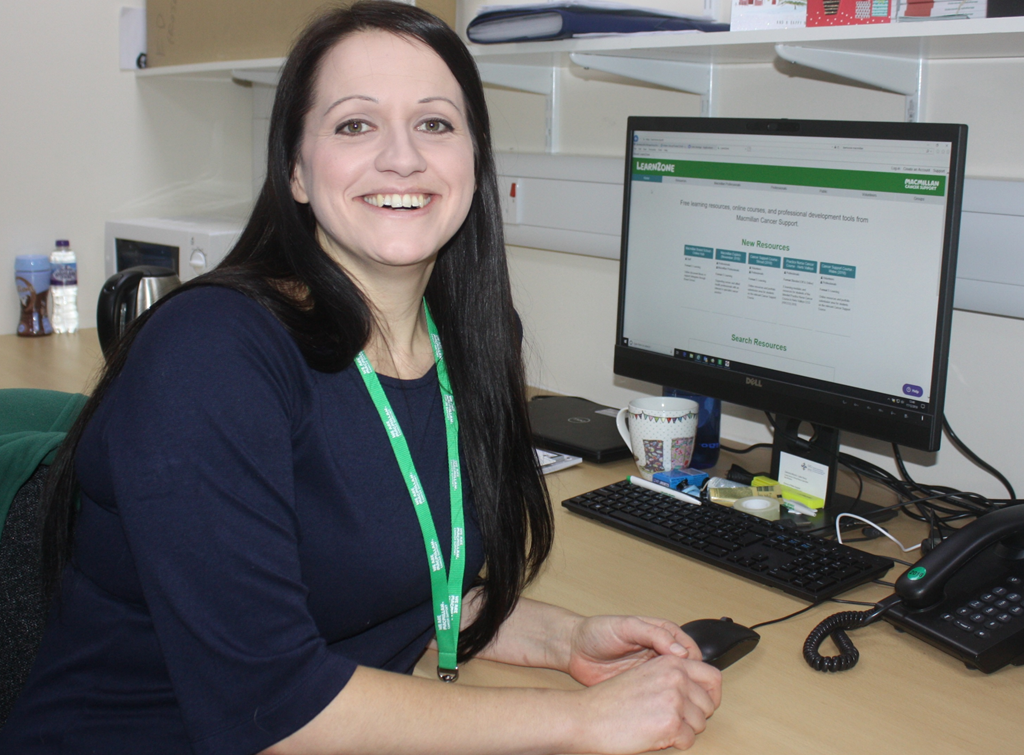Meet the new Macmillan Acute Oncology Service team at the Princess of Wales Hospital

We caught up with Macmillan professional, Louise Hymers, to find out about the new Acute Oncology Service based at the Princess of Wales Hospital in Bridgend.
Hi Louise! Tell us a bit about your team? Who is in it? What does each team member do?
There are just the two of us in the team, myself (Louise Hymers) as the Macmillan Acute Oncology Service Specialist (AOS) Nurse and Claire Butcher is the Macmillan Acute Oncology Service Coordinator. Although we’re only a small team we are well supported by others in the hospital.
What does the Acute Oncology Service at the Princess of Wales Hospital in Bridgend do and how does it help people affected by cancer?
Put simply the Acute Oncology Service in Princess of Wales Hospital is here to provide specialist advice and support to three key groups of people with a cancer diagnosis during an admission, those in hospital due to complications of cancer, or due to complications of anti-cancer treatment.
We’re also here to provide advice and support when people are diagnosed with a new cancer during an acute admission.
A key part of our role is also to aid communication with the team treating the person’s cancer so they are kept up to date with the current situation. Often people have their cancer care in a different hospital.
For example, someone may go to Velindre Hospital in Cardiff for their treatment and then be admitted to Princess of Wales as their local hospital if they are unwell.
If someone is admitted during a cycle of treatment we liaise with their cancer team to rearrange appointments as appropriate.
We will also be auditing compliance to local and national targets within the Princess of Wales Hospital and using this data to improve patient care as needed.

When was the Acute Oncology Service set up and what was the need?
The AOS here is a new service, we started taking referrals at the beginning of November this year.
In recent years, several key UK reports has highlighted the need for an AOS within acute hospitals.
In Wales it forms part of the Welsh Government’s current Cancer Delivery Plan.
The key factor behind establishing AOS across Wales is to improve cancer patient care, experience and outcome when admitted to hospital as an emergency.
You’re a new team in a new service at a hospital that you have never been based in before – what are the challenges?
I think the biggest challenge has to be introducing ourselves and the service to everyone across the hospital, by the nature of AOS we see patients in any inpatient are and A&E, so as you can imagine that’s a lot of people to meet!
How has Macmillan Cancer Support in Wales helped this service?
Macmillan has been involved in the whole process of developing the service, long before either myself or Claire were in post!
We’re initially funded by Macmillan for three years, having the support of Macmillan when developing a new service is so helpful, it provides an extra layer of support as well as extra resources and opportunities for professional development to support us in providing the best possible care to people with cancer.
What are your ambitions for the service in the first year?
We’d like to embed fully within the hospital and become a valuable part of the inpatient team. Also, we’d like to be able to show how we have impacted on patient care, experience and outcome during this time.
What do health professionals working at the Princess of Wales Hospital in Bridgend need to know about your service?
That we’re here to help, if you have any questions or need any advice about an acutely unwell cancer patient just get in touch.
What’s the best thing about setting up a new service like this? And the most challenging?
Setting up a new service is both challenging and rewarding. The best thing about setting up the service is knowing you’re making a difference when someone is admitted to hospital which is naturally a daunting time. One of the key challenges is integrating within the wider teams and becoming a valued resource for other health professions within the hospital, this is also one of the best things about setting up a new service as well, when referrals start coming through you know you’re becoming part of the team!